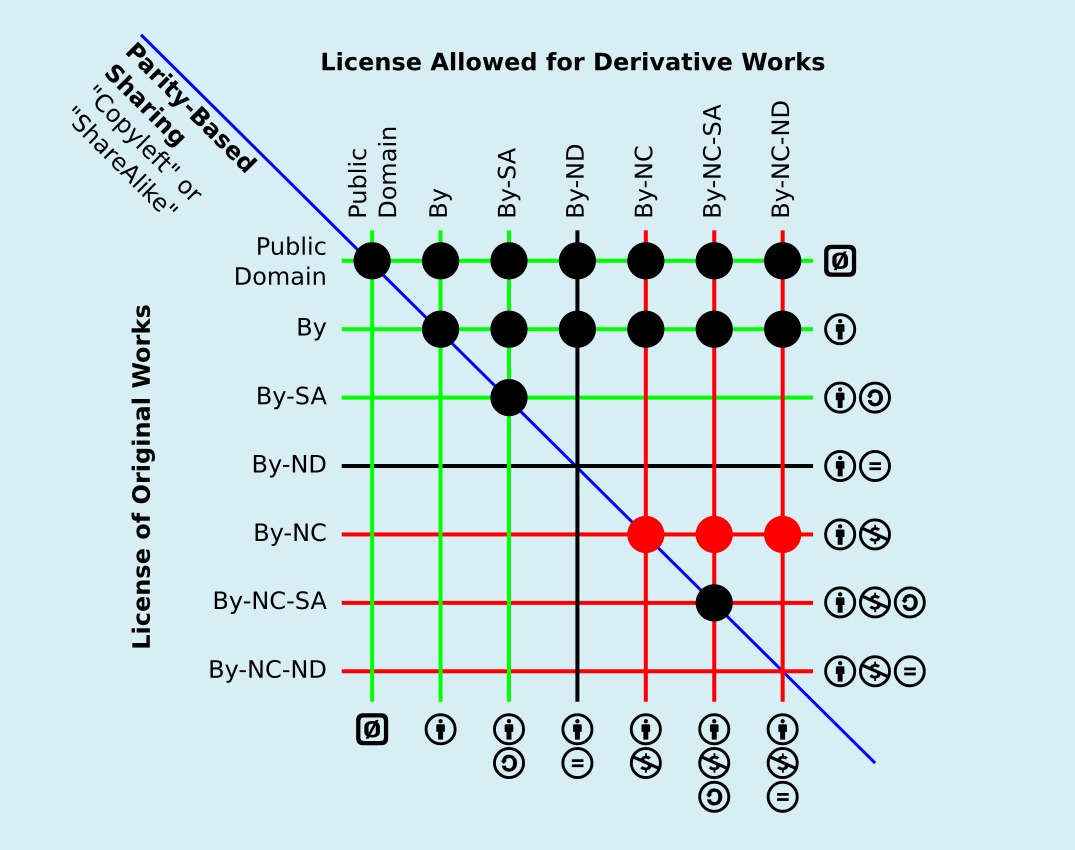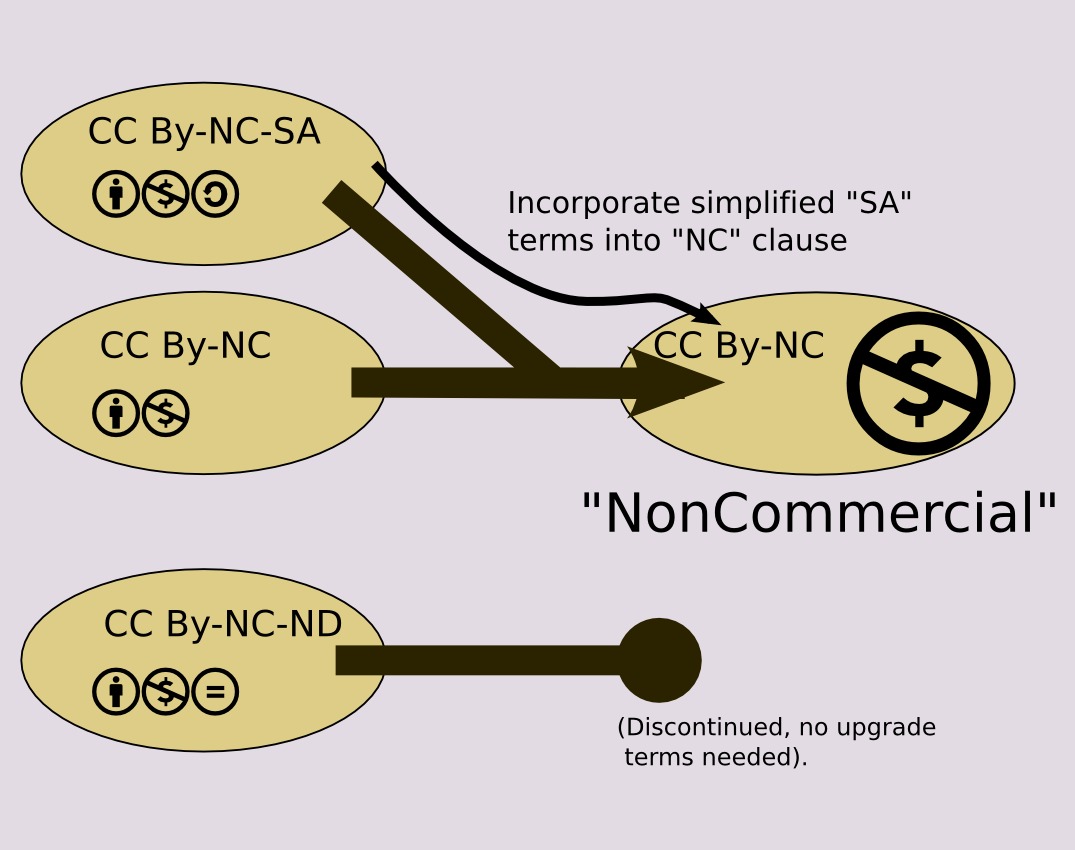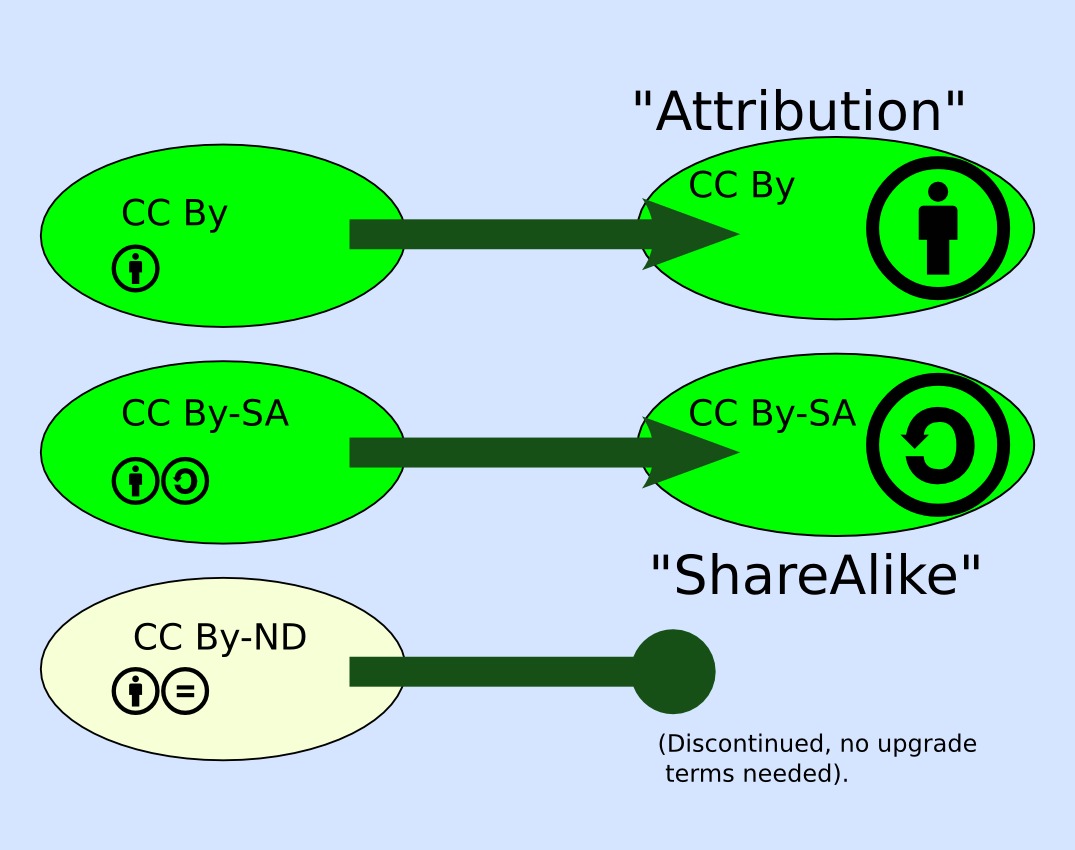In a recent blog, Nina Paley, the animator behind the free-licensed animated film, "Sita Sings the Blues", complained of the enormous confusion caused by poor differentiation of the Creative Commons licenses. In particular, there's a great deal of confusion over the difference between "NonCommercial" and "ShareAlike" licenses. Maybe the Creative Commons licensing system is still too complex? I'd suggest that only three licenses are really needed: "Attribution" (CC By), "ShareAlike" (CC By-SA), and "NonCommercial" (CC By-NC), and that the others are essentially deadweight that's holding the movement back.
In a recent blog, Nina Paley with the degree to which Creative Commons' "NonCommercial" and "ShareAlike" terms are confused by distributors. It is frequently assumed that "ShareAlike" works can only be used in non-commercial ways, and this is absolutely contrary to the intent of licensors like Paley who've chosen "ShareAlike" licensing, precisely because it does permit commercial re-use:
This is a real problem. Some artists have re-released Sita remixes under Creative Commons Non-Commercial licenses. Many bloggers and journalists assume the non-commercial restrictions, even when the license is correctly named
In her article, she supports an idea first suggested by Karl Fogel of QuestionCopyright, of re-branding the "CC By-SA" licenses as "CC PRO". It's intriguing, but it would just add yet another name to an already confusing mix. I think the real problem is the existence of an abomination called the "Creative Commons Attribution-NonCommercial-ShareAlike" license, which, really, makes zero sense to have published.
Somebody's probably already screaming for their CC By-NC-SA license by now. That's understandable -- it's the most popular CC license by far. But its popularity stems from a fundamental misunderstanding of its meaning
Somebody's probably already screaming in defense of their CC By-NC-SA license by now. That's understandable -- it's the most popular CC license by far. But its popularity stems from a fundamental misunderstanding of its meaning. As I hope to show you, it really doesn't differ in any important way from the simpler concept of the By-NC license, because the "ShareAlike" (SA) clause (when combined with the "NonCommercial" NC clause) is meaningless for all practical purposes.
I'm also going to suggest that the "NoDerivatives" (ND) module should be abandoned entirely. This is perhaps surprising, given that even Richard Stallman has supported using the CC By-ND license for certain purposes, but again, I assert that that is due to fundamental misconceptions about its effectiveness.
I am not going to suggest eliminating the "non-free" CC licenses, because while free culture is increasingly offering a better alternative, there is still considerable utility to the buffer zone between free and proprietary publishing worlds. There's a difference between choosing not to use certain methods and insisting that no one else do so!
NoDerivatives Does Nothing
Okay, this is not quite true, but the niche of application for the "NoDerivatives" (ND) licensing module is so tiny that I think we have to question whether it's worth the trouble it causes. Perhaps more importantly, it contributes to a false sense of security, since most of the people who are using it expect it to do more than it really can.
What ND can't do:
- It can't prevent "fair use" or "fair dealing" uses
- It can't eliminate parodies or pastiches of your work
- It can't prevent your work from being quoted (in or out of context)
- It can't prevent your message from being misrepresented or placed in a bad light
The last three are really a consequence of the first: free expression laws insist that these kinds of uses cannot be restricted by copyright, as they would prevent the free interchange of ideas. There are of course, countries that don't respect freedom of speech so highly, but then they don't necessarily respect copyright either (and at some point, if restrictions are high enough, ethics demands that the law be ignored in any case -- you are asking for an unethical level of control over others, whether the law grants it to you or not, and the Creative Commons really shouldn't be encouraging that kind of behavior).
It's absolutely clear that ND cannot interfere with fair use or fair dealing rights
It's absolutely clear that "ND" cannot interfere with fair use or fair dealing rights. Not only does the law usually trump any license with respect to these free speech issues, but the license text itself says so (from the Legal Code of the CC By-ND license):
Nothing in this License is intended to reduce, limit, or restrict any uses free from copyright or rights arising from limitations or exceptions that are provided for in connection with the copyright protection under copyright law or other applicable laws.
What ND doesn't need to do:
- It doesn't need to force modified versions to remove your name
- It doesn't need to protect your reputation or your opinions from misrepresentation
- It doesn't need to ensure that those who modify your work take responsibility for their actions
These are sometimes cited as advantages to the CC By-ND license, but in fact, they have nothing to do with ND. They are provided by the terms of the "Attribution" (By) part of the license -- and thus these protections are shared by all of the CC licenses. Essentially, they allow you to eliminate your endorsement of modifications of your work that you don't approve of (either because they make your work look bad artistically, or because they support political agendas you disagree with).
In fact, under the terms of the "Attribution" module, you can insist pre-emptively that any altered versions should not bear your attribution (The By module allows you to demand non-attribution as well as attribution). Obviously, you can't prevent them from stating as an actual fact that the derived work is based on your work. But you can take your name off of the official credits for it.
This separation of the right to copy and build on other people's work from the act of endorsing such uses is a very important element of the ethos of free culture
This separation of the right to copy and build on other people's work from the act of endorsing such uses is a very important element of the ethos of free culture.
As the saying goes, "Even the Devil quotes scripture," and the freedom of speech guarantees that your enemies can quote your words right back to you if they want. You can do the same to them, but you can't shut them up.
Most people using the ND clause are either imagining that it does give them this kind of power over others (and thus encouraging a very dangerous mindset favorable to censorship and restriction of ideas) or they are imagining that they need it to protect their endorsed expressions from being distorted by others, making it seem that they created something they would find offensive.
Is there any ground in between? Is there anything that "By-ND" lets you control that "By" doesn't? Not very much! And, more importantly, what little it does do, is probably an example of copyright law trampling free speech rights.
Finally, it should be noted, that there is a much simpler license if all you want to do is allow your work to be distributed unaltered, and that is to use a simple grant such as "This document may be distributed verbatim, without alterations, without limit, so long as the author is credited." It's hardly necessary to use a Creative Commons license for that, and doing so really does not convey much new information.
There is no important difference between By-NC and By-NC-SA licenses
The argument here is not that By-NC-SA is somehow evil and should be eliminated, but rather that it does not differ signficantly from By-NC in terms of its practical effect, and -- stipulating that that is true -- it makes no sense to use such an over-complicated name. Instead, the simpler of the two license names should be used.
If it is determined that some aspect of the "ShareAlike" (SA) module is actually useful for By-NC work, then such language should probably be quietly merged into the "NC" module. It's unlikely that existing users of the By-NC license would object to this, for the reasons I'm about to explain.
Myths about the SA part of By-NC-SA
Consider these two myths about By-NC-SA licenses that I hear repeated over and over again by licensors:
- "The 'SA' clause allows people to share my work"
- "Without the 'SA' clause, people could exploit me by making commercial uses of 'derivatives' of my work"
Neither is true.
First of all, the "SA" clause doesn't make the By-NC license more open, it restricts it further (at least theoretically). People can share your work just fine under the "By-NC" license, just as they can with any of the basic six Creative Commons licenses.
What the "SA" clause does is to restrict redistribution to only those people who "ShareAlike" -- that is, release whatever changes they make under the same license.
The only real reason most people care about using "ShareAlike" with "NonCommercial" is because they think it protects them from commercial exploitation of the derivative works.
However, this isn't necessary. Deriving from a work in order to make commercial use of the derivative is considered "commercial use." Therefore, the "NC" clause is already "ShareAlike" in the only way that matters to most users of the license.
CC lawyers have officially stated that this is the intentional impact of the "NC" module, although, as with most legal questions about licenses, this would ultimately be determined in a court case, if it came to a conflict (the intent of the authors might or might not be honored).
So what can you do with By-NC that you can't do with By-NC-SA?
Creative Commons provides a few charts to explain how all of its licensing modules interact (see Figure 1), and the result for By-NC is very simple:

Derivatives of a By-NC work can use any of these licenses:
- By-NC -- Of course, they can use the same license
- By-NC-SA -- They can switch to By-NC-SA, but this changes nothing
- By-NC-ND -- meaning, that to whatever degree ND is functional, they can take your work and choose not to allow you to incorporate their changes into your future work
Note in particular that they cannot use either of the free CC licenses (By or By-SA), nor any other free licenses, nor can they be used for any "commercial" purpose (which is a very broad term as I've explained in earlier columns).
So, in fact, there are a few differences between By-NC and By-NC-SA in a technical, legal sense. But are any of these important to the licensor?
Releasing derivatives under the By-NC license is probably what is wanted. Being able to switch to By-NC-SA is pointless if there is no actual difference in using By-NC-SA, so we can discount that entirely.
Releasing under the By-NC-ND license seems, if anything, to be wholly detrimental to the original author. Why would you want to grant people the special right to take your work and lock it away from you (and the rest of the world)? I seriously doubt many users of the By-NC license actually have this intent when they choose the license.
"But wait!" you are probably asking, "Didn't you say you want to get rid of By-NC-SA? So why are you now defending it against By-NC?" Well, note first of all that the danger is mostly eliminated if the ND module is eliminated.
But it's true that a more careful analysis might reveal other problems with not using some of the SA terms. If so, though, those terms could simply be incorporated into the NC terms, which already contain a certain degree of copyleft impact, since they are said to constrain the commercial use of derivatives. But there's certainly no reason to keep calling this "NonCommercial" license anything but that. Adding the expression "ShareAlike" just confuses the issue.

In other words, since the Creative Commons has already asserted that the "NC" clause is, by itself, essentially "share alike" with respect to the NonCommercial clause itself, then it only makes sense that the rest of the "ShareAlike" terms should be incorporated into it. Then there is no need for a separate module and therefore no separate name. What I am proposing is to merge the terms of the present By-NC-SA license into the By-NC license. Both licenses would "upgrade" to the same license, which would simply be known as "By-NC" or even, for greater simplicity, simply "Creative Commons NonCommercial" or "CC-NC" (all of the CC license now have the Attribution clause, so it's somewhat redundant to use it for disambiguation).
Dropping the ND module is easy of course. The fact that the licenses don't permit derivatives means there are no legal derivatives on which to change the licensing. They are simply dead-ends, as they've always been.

Just Three Main Licenses
Now we have much simpler picture. With the ineffective and unnecessary "ND" eliminated, and the redundant "NC" licenses merged into a single case, it would be much easier to understand the Creative Commons licenses, and to promote them to others:
- CC-By -- The "Creative Commons Attribution" license would function as it does today, as a very liberal, non-copyleft license for aesthetic works
- CC-By-SA -- The "Creative Commons ShareAlike" license would be the tool of choice for copyleft-based free-culture projects, as it has already been for some time now
- CC-By-NC -- The "Creative Commons NonCommercial" license would continue to function as a tool for promoting otherwise proprietary work on the fringe between free and non-free culture. It would not, however, create as much confusion with the other two, nor would there be any need to subdivide it
Will this pig fly?
As I write this, the Creative Commons is running a fund-raising campaign, and their website proudly proclaims the slogan "Saving the world from failed sharing!" I wish I could say without reservation that they really lived up to that goal and that I fully supported and endorsed them, but the truth is that Creative Commons has often seemed to be perversely attached to complexity in licensing, and they attach far too much importance to the relative popularity of their existing licenses(constantly falling back on the fact that the CC By-NC-SA license, which has come to be considered, by most of the rest of the world, as "The Creative Commons License" remains their most popular product). But I think they naively assume that people are always thinking clearly and completely through their license choice, when, as far as I can tell, the truth is something closer to "jumping on the bandwagon." The CC By-NC-SA license is popular mostly because it was popular. And it was popular mostly because many early adopters didn't fully understand it.
So, sadly, I'm not really very hopeful that Creative Commons will listen to this plea, but I hope so. There's bound to be another version of the licenses in time, and I think this kind of consolidation might be the right thing to focus on when that comes up.
[1] Data taken from the Creative Commons Frequently Asked Questions